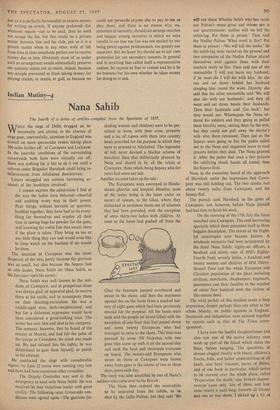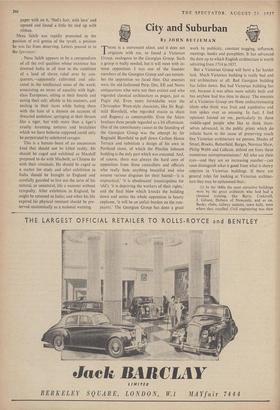Indian Mutiny-4
Nana Sahib
The fourth of a series of articles compiled from the Spectator of 1857.
RILE the siege of Delhi dragged on in- terminably and almost, in the absence of siege guns, uneventfully, attention in England was riveted on more spectacular events taking place 300 miles farther off : at Cawnpore and Lucknow. In the anarchic conditions of the surrounding countryside both forts were virtually cut off; there was nothing for it but to sit it out until a column under Brigadier Havelock could bring re- inforcements from Allahabad downstream.
Letters smuggled out contain harrowing ac- counts of the hardships involved I cannot express the admiration I feel at the way the ladies have behaved—cheerful and assisting every way in their power. Poor things, without servants or quarters, huddled together, they have had to do every- thing for themselves and employ all their time in sewing bags for powder for the guns, well knowing the awful fate that awaits them if the place is taken. They bring us tea or any little thing they can and would even like to keep watch on the bastions if we would let them.
The situation at Cawnpore was the more desperate of the two, partly because the garrison Was so small, but also because the Sepoys had an able leader, Nana Sahib (or Nena Sahib, as the Spectator spelt his name): Nena Sahib was well known to the resi- dents of Cawnpore; and in prosperous times was always glad, or appeared glad, to receive them at his castle, and to accompany them on their shooting-excursions. He was a middle-aged man, dark-complexioned, and but for a dishonest expression would have been considered a good-looking man. The writer has seen him and shot in his company. The moment, however, that he heard of the mutiny at Meerut, and had felt the pulse of the troops at Cawnpore, his mind was made up. We had refused him his rights; he was determined to gain them himself, or perish in the attempt.
He conducted the siege with considerable Vigour; by June 22 stores were running very low and there had been numerous other casualties.
The Deputy Controller was sent in this emergency to treat with Nena Sahib. He was received by that victorious leader with great civility. The following most favourable con- ditions were agreed upon—The garrison (in- eluding women and children) were to be per- mitted to leave, with their arms, property and a lac of rupees with them into country boats provided for the purpose in which they were to proceed to Allahabad. The ingenuity of hell never devised a blacker scheme of treachery than that deliberately planned by Nena and shared in by all the rebels at Cawnpore, those rebels being Sepoys who for years had eaten our salt.
Another account takes up the tale : The Europeans were conveyed in Hindo- stanee gharries and hospital dhoolies, most of the ladies being in the latter under an escort of sowars, to the Ghat, where they embarked in seventeen boats out of nineteen that had been provided, with the exception of some thirty-two ladies with children. As soon as the boats had pushed off from the Ghat the boatmen jumped overboard and swam to the shore; and then the mutineers opened fire on the boats from a masked bat- tery of eight guns which had been previously erected for the purpose. All the boats were sunk and the people on board killed with the exception of one boat that had passed down and some twenty Europeans who had managed to swim to the shore. This boat was pursued by some 500 Nujeebas with two guns who came up with it on the second day and sunk the boat and destroyed everyone on board. The twenty-odd Europeans who swam on shore at Cawnpore were blown away from guns in the course of two or three days, some each day.
The story was later amplified by one of Nana's soldiers who came over to the British : The Nena then ordered the memsahibs to be separated from the sahibs, to be shot by the Gillis Pultun; but they said 'We will not shoot Wheeler Sahib who has made our Pultun's name great and whose son is our quartermaster; neither will we kill the sahib-log. Put them in prison.' Then said the Nadire Pultun 'What word is this? Put them in prison ! —We will kill the males.' So the sahib-log were seated on the ground and two companies of the Nadire Pultun placed themselves over against them with their muskets ready to fire. Then said one of the memsahibs 'I will not leave my husband; if he must die I will die with him.' So she ran and sat down behind her husband clasping him round the waist. Directly she said this the other memsahibs said 'We will also die with our husbands'; and they all went and sat down beside their husbands. Then their husbands said 'Go back'; but they would not. Whereupon the Nena or- dered his soldiers and they going in pulled them forcibly'away, seizing them by the arm, but they could not pull away the doctor's wife who there remained. Then just as the Sepoys were going to fire the padre called out to the Nena and requested leave to read prayers before they died. The Nena granted it. After the padre had read a few prayers the sahib-log shook hands all round, then the Sepoys fired.
Nana in the meantime heard of the approach of Havelock under the impression that Cawn- pore was still holding out. The two armies met about twenty miles from Cawnpore, and the Sepoys fled.
The pursuit took Havelock to the gates of Cawnpore; not, however, before Nana himself had had time to finish his work.
On the morning of the 17th July the force marched into Cawnpore. The soul-harrowing spectacle which there presented itself to them beggars description. The extent of the fright- ful catastrophe now became known. A wholesale massacre had been perpetrated by the fiend Nena Sahib; eighty-six officers, a hundred and ninety men of HM's Eighty- Fourth Foot, seventy ladies, a hundred and twenty women and children of HM Thirty- Second Foot and the whole European and Christian population of the place including civilians, merchants, shopkeepers, engineers, pensioners and their families to the number of about four hundred were the victims of this satanic deed.
The vivid perfidy of this incident made a deep impression, deeper perhaps than any other in the whole Mutiny, on public opinion in England. Sentiment and indignation were aroused together by reports such as that of The Times corre- spondent: 1 have seen the fearful slaughterhouse and also saw one of the native infantry men wash up part of the blood which stains the floor, before hanging. The quantities of dresses clogged thickly with blood, children's frocks, frills, and ladies' underclothing of all kinds, also boys' trousers, leaves of Bibles, and of one book in particular, which seems to be strewed over the whole place, called 'Preparation for death,' also broken daguer- reotype-cases only, lots of them, and hair some nearly a yard long; bonnets all bloody and one or two shoes. I picked up a bit of paper with on it, 'Ned's hair, with love' and opened and found a little bit tied up with ribbon.
Nana Sahib was rapidly promoted to the position of evil genius of the revolt, a position he was far from deserving. Letters poured in to the Spectator: Nena Sahib appears to be a compendium of all the evil qualities whose existence has doomed India in all time to the condition of a land of slaves ruled over by con- querors,—apparently cultivated and edu- cated in the intellectual sense of the word; associating on terms of equality with high- class Europeans, sitting at their boards and eating their salt; affable in his manners, and smiling in their faces while hating them with the hate of a daemon on account of thwarted ambition; springing at their throats like a tiger, but with more than a tiger's cruelty inventing tortures and brutalities which we have hitherto supposed could only be perpetrated by unlettered savages.
This is a human beast of an uncommon kind that should not be killed rashly. He should be caged and exhibited as Macduff proposed to do with Macbeth, as Chinese do with their criminals. He should be caged as a matter for study and after exhibition in India should be brought to England and carefully guarded to live out the term of his natural, or unnatural, life a monster without sympathy. After exhibition in England, he might be returned to India; and when his life expired his physical remnant should be pre- served anatomically as a national warning.































 Previous page
Previous page